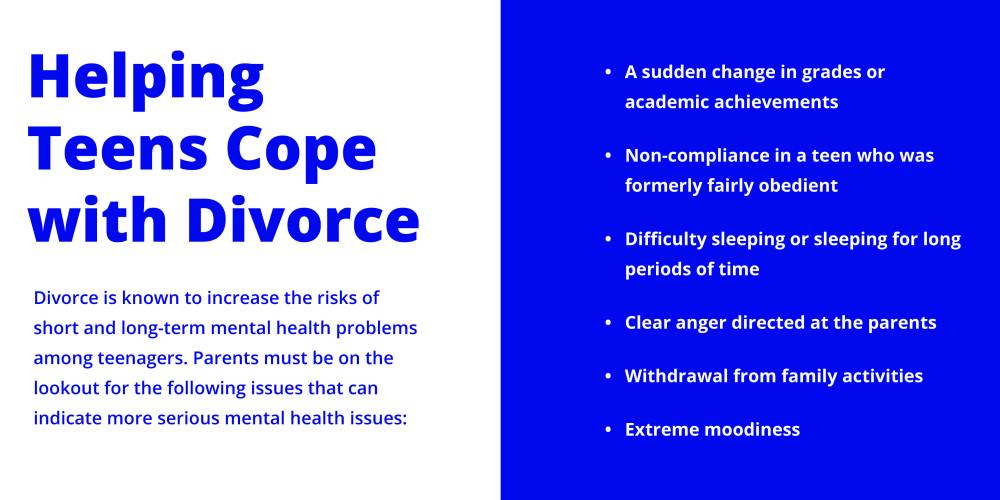Managing Troubled Teens and Divorce
 Divorce can place an emotional strain on parents and children. Teenage children may act out in response to the divorce, or, in some cases, a troubled teen may have contributed to the divorce, and then his or her behaviors worsen during the divorce. In a worst-case scenario, a troubled teen can even become involved in dangerous or criminal activities.
Divorce can place an emotional strain on parents and children. Teenage children may act out in response to the divorce, or, in some cases, a troubled teen may have contributed to the divorce, and then his or her behaviors worsen during the divorce. In a worst-case scenario, a troubled teen can even become involved in dangerous or criminal activities.
When parents are locked in a battle over the division of marital assets, the allocation of parental responsibilities, and child support and spousal support determinations, having a teenager acting out can make the divorce process much more difficult. When it feels as though your life is crumbling around you, dealing with a troubled teen can push you to the edge.
Should you find yourself in this position, it is important to speak to a knowledgeable Batavia, IL family law attorney who can also help you deal with your teen, making the divorce process less stressful for all those involved. Attorney Williams has experience with troubled youth that can help you ensure your teenage son or daughter is getting what they need during and after the divorce.
What Is a Parent’s Role Following Divorce?
While parental roles may change following a divorce, both parents must continue to help their teen navigate his or her life in the best way possible. Parents must work together, regardless of how they feel about one another, to spend time with their teens, pay attention to and correct any unacceptable behaviors, and protect teens from harmful influences.
Teenagers are going through an emotionally volatile time in their lives without adding divorce into the mix. Divorce can trigger feelings of guilt, depression, and uncertainty that translate into destructive behaviors. Since the parents’ divorce may be the root cause of the teen's problems, they may not want to speak to their parents about their feelings.
Regardless of whether a teen wants to speak to his or her parents, the parents must persist. If the teen is not talking to his or her parents, then the parents are responsible for finding a therapist or counselor that the teen will talk to.
Helping Teens Cope with Divorce
Since teens may seem more like young adults than children, some parents may lean on the teenager to help with chores or younger siblings, use them as go-betweens with the other parent, or discuss grown-up issues with them. Teens are certainly more mature than their younger siblings, but they still need lots of parental support as they learn to cope with the divorce.
It is not unreasonable to expect a teen to have his or her share of chores, but parents should remember that the teen is not an adult and should not be expected to parent his or her siblings. Parents should also refrain from discussing the private details of the divorce with their teens. Just because a teenager is older does not mean that he or she needs to know that a parent committed adultery or had a gambling problem.
Children – including teenagers – always benefit from having warm, loving relationships with both parents and spending time with both parents. Regardless of how the parents feel about one another, saying derogatory things about the other parent to a teen is simply not acceptable. Parents should talk to their adult friends, family members, or a therapist, but they should never use their teen as a counselor or to relay messages to the other parent.
Divorce is known to increase the risks of short and long-term mental health problems among teenagers. Parents must be on the lookout for the following issues that can indicate more serious mental health issues:
- A sudden change in grades or academic achievements
- An increase in stress
- Non-compliance in a teen who was formerly fairly obedient
- Behavioral issues
- Difficulty sleeping or sleeping for long periods of time
- Clear anger directed at the parents
- Sadness
- Low self-esteem
- Withdrawal from family activities
- Isolation
- Loss of appetite
- Extreme moodiness
- Anxiety and depression
- A sudden fear of abandonment
- Suicidal ideations or attempts
- Substance abuse
- Other risky behaviors, including sexual activity
- Difficulty forming close relationships or making new friends
One of the most significant predictors of how well a teen will get through his or her parents’ divorce lies in how well the parents get along (at least in front of the teen) throughout the divorce. Choosing mediation or collaborative divorce can help control parental conflict, helping parents focus on building a healthy future for all those involved. Collaborative divorce includes mental health professionals who can recognize and address any emotional issues before they spiral out of control.

Additional Ways You Can Help Your Teen During and After Divorce
Allowing a teenager the time to adjust to the divorce and to share his or her feelings with both parents is crucial. Teens need a safe space to feel their feelings. If a teen is angry, the parents need to accept that anger calmly without responding with anger of their own. If a teen is active in extracurricular activities, this is not the time to slack off on attending these activities.
If the parents cannot be in the same space without an argument, they can alternate attending the teen’s activities. Both parents must be consistent with rules concerning driving, cell phone use, curfews, and spending time with friends. Parents should model good behavior and effective problem-solving, working hard to communicate openly and honestly with teenagers while consistently being supportive. Never argue in front of a teenager (or any of the children, no matter their ages), and never put them in the middle of parental conflicts.
Contact a Kane County, IL Divorce Lawyer
An experienced St. Charles, IL divorce attorney from The Law Office of Matthew M. Williams, P.C. can help you create a parenting plan that considers your teenager’s age and maturity. Having plenty of parenting time with the teen is important for both parents. Attorney Williams focuses his practice on mediation and collaborative divorce to reduce costs and make the process quicker, easier, and friendlier. Call 630-409-8184 to schedule an initial attorney meeting to discuss your divorce issues.

 630-409-8184
630-409-8184













